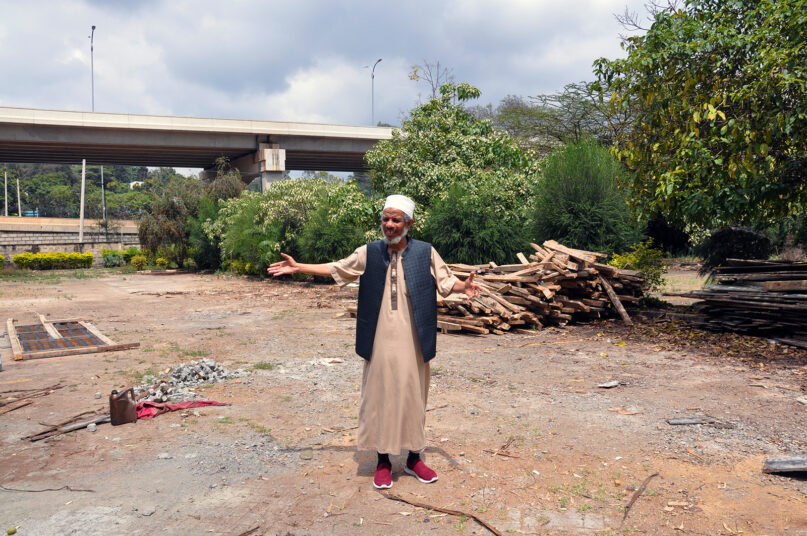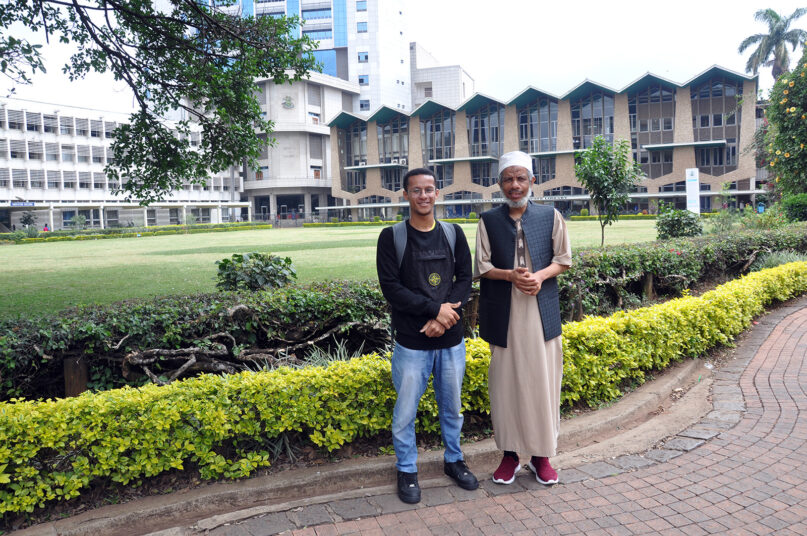NAIROBI, Kenya (RNS) — After a half-century, students, lecturers and the Muslim community at the University of Nairobi will soon have a small mosque on the institution’s main campus.
The 54-year-old university is Kenya’s oldest and is the top-ranking in East Africa, but the push for establishing the mosque is as old as the institution itself. Muslims within the university say the clamor for the mosque started around 1972, two years after the then-college became an independent university.
Politics, differences between Sunni and Shia Muslim groups and the university administration’s concern over ownership all kept administrators from approving the mosque in the past.
But that changed last year — after many letters and discussions — when the administration allowed the construction of the temporary mosque on an empty car park on the campus.
“We are in the process of erecting the mosque, with the support from the students and the Muslim community. The structure should be up before December,” Sheikh Muhammad Abdallah, the Muslim chaplain at the university, told RNS in an interview. “It means a lot … This will give that tranquility and calmness needed when communicating with their creator, for those who go there.”
According to the chaplain, the number of Muslim students at the university has been growing — and the new mosque will help serve that community.

Sheikh Muhammad Abdallah shows the current parking lot where a mosque will be built on the University of Nairobi campus in Nairobi, Kenya. (RNS photo/Fredrick Nzwili)
The mosque will be constructed using modern technology to keep the cost as low as possible. Abdallah said the project will cost between $47,000 and $67,000 (6-8 million Kenyan shillings), including prayer carpets and public address systems.
At a single sitting, the mosque will accommodate about 300 people, qualifying it as a small mosque, said Sheikh Hassan Kinyua Omari, a religious scholar at the university.
“Nairobi is the leading university in East Africa, and I think this will be a great lesson for all universities in this country that we must give equal respect to all religions,” he said, adding that constructing a mosque on campus will make the university an interfaith icon institution. Omari said there is already a chapel and a church on the campus and that Pope Francis visited the campus in the past.
Muslim students currently pray at a space behind the main library, where they often face distraction from passing students, according to officials.
“You have seen the dire condition of where we are praying,” said Mohammed Abdul Sheemaka, the chairperson of the Muslim Students Association of the University of Nairobi. “It’s coincidental you came here when it’s not raining, but when it rains, it would be muddy and so wet; you can’t pray in that area.”

Mohammed Abdul Sheemaka, chairperson of the Muslim Students Association, left, and Sheikh Muhammad Abdallah, Muslim chaplain at the university, pose together on the University of Nairobi campus in Nairobi, Kenya. (RNS photo/Fredrick Nzwili)
According to the student leader, Muslims at the university and surrounding campuses, including the former students, are celebrating the new mosque.
“When people heard that finally the university has allocated us land, everyone … thanked God … because this is a struggle that has been here for long,” he said.
The student leader said the mosque was long overdue since other East African universities, like the University of Dar es Salaam in Tanzania and the Makerere University in Uganda, have mosques.
“We have been asking, ‘Why not the University of Nairobi?’” he said.
When it is finally constructed, the Mosque will stand a few meters from St. Paul’s University Chapel — a Catholic space — St. Andrew’s Presbyterian Church Cathedral and Uhuru Highway Lutheran Cathedral, among other symbols of Christian traditions.
But the Sheikh said three chaplains at the university have supported the mosque.
“I don’t foresee any resistance, but in case it comes, that is the matter of the administration,” he said.
The Rev. Hosea Kiprono Mitei, the Protestant chaplain at the university, confirmed that the mosque was unlikely to face any resistance from the Christians since all others have spaces for prayer and worship.
“The Muslim students do not have a proper place for their prayers. More so, this is not a Christian institution. I don’t think there would be any resistance,” he said.
Abdallah hopes the mosque can become a place where the students can find calm and tranquility and where they can relax, recite the Quran or have prayers or engagement among themselves. Muslim leaders can also visit to give talks to uplift the students’ spirituality.














